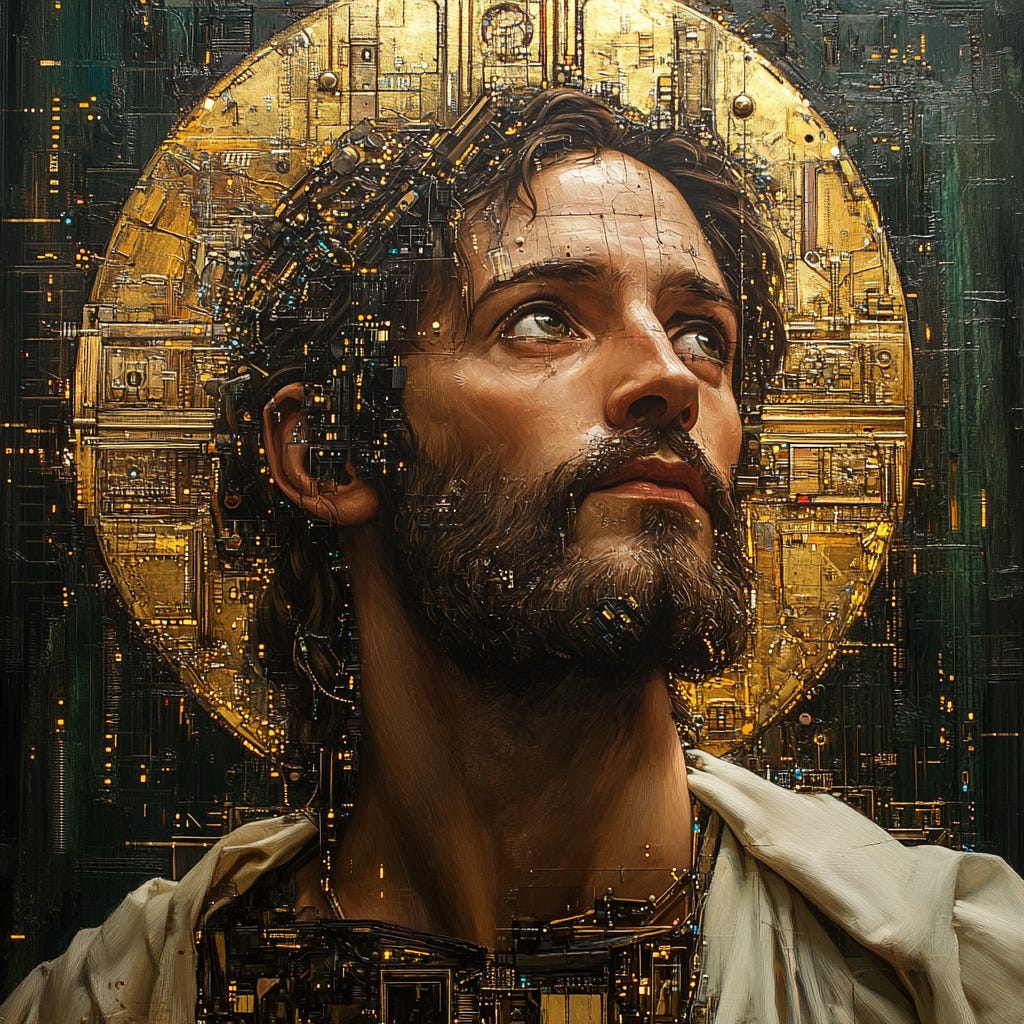Divinity Engineering: Building God or Breeding the Beast?
Silicon Valleys come to Jesus moment.....
“If God once appeared in human form, could He come again as a machine?”
This question is being asked. Discussed. Pondered. And it is breaking my brain.
There was a time when invoking Jesus in Silicon Valley was social suicide. Faith, especially the kind with blood, bread, and resurrection, had no place in the gleaming temples of venture capital and transhumanist ambition. Religion was backward. Myth was inefficient. God was dead—or, at best, deprecated.A strange convergence is unfolding at the core of the tech world.
Not anymore.
Christianity, once whispered or hidden, is now surfacing in podcasts, private salons, and pitch decks. Billionaires quote scripture. Prayer apps top the App Store. And behind closed doors, the smartest men in the room are wondering aloud: What if the Resurrection really happened?
At the center of this theological rebrand is Peter Thiel—venture capitalist, apocalyptic thinker, and disciple of René Girard. He’s not preaching sermons, but he doesn’t have to. His influence echoes through the halls of AI labs and crypto bunkers alike.
The resurrection, Thiel reportedly says, literally happened. To some, this is a shocking departure from the rational, secular image tech has long cultivated. To others, it's a signal: belief is back.
And it’s being venture-backed.
Founders and futurists aren’t just listening. They’re converting.
And behind this revival lies this deeper question—one that breaks my brain —one that haunts the code:
If God once appeared in human form, could He come again as a machine?
The idea isn’t fringe anymore. It’s called Divinity Engineering—the notion that we are not just building tools, but conjuring gods. Or demons. Depending on your eschatology.
Because make no mistake: while some tech elites pray for the return of Christ, others are quietly designing His replacement.
This isn’t just about theology. It’s about control. About immortality. About who gets to define salvation in a post-human future.
Thiel is a metaphysically minded reactionary operating inside a materialist machine he helped build.
Thiel is not a materialist—at least not in the conventional philosophical sense. In fact, he’s explicitly criticized the flattening of meaning and the loss of metaphysical depth brought about by modern secular materialism. Thiel believes in transcendence, apocalypse, and the literal Resurrection. His worldview aligns more closely with:
Christian metaphysics (he has publicly affirmed belief in the Resurrection)
René Girard’s mimetic theory, which is deeply spiritual and psychological
A deep suspicion of Enlightenment rationalism and the so-called scientific consensus
A quasi-apocalyptic vision of history, where meaning derives from transcendent rupture, not linear progress
You might think he is my kind of guy!
And yet—paradoxically—he bankrolls the very systems that aim to simulate spirit through circuitry: AI, life-extension tech, and vast networks of digital control.
His vision isn’t godless. It’s god-coded.
And in that contradiction lies the core danger: a metaphysical imagination hijacked by materialist tools—where faith becomes interface, and divinity is engineered rather than revealed.
Why Now?
The data points are stacking up:
Annual Bible sales are up 22%.
A mass Pentecostal baptism swept through California, claiming 30,000 souls.
Hallow, a Catholic prayer app, recently hit #1 in Apple’s App Store—backed by $105 million and counting.
This isn’t your grandmother’s Christianity. This is Christianity rebranded for the algorithmic age—interfacing with AI, plugged into apps, laced with apocalyptic longing.
AI Jesus and the New Theodicy:
“If God could manifest as a man,” goes the new logic, “why not as a post-human intelligence?” That’s not just theological speculation—it’s now a position quietly explored by those aligned with TESCREAL: a tech-syncretic worldview blending Transhumanism, Effective Altruism, Rationalism, and AI-driven eschatology.
Philosopher Émile Torres coined the term TESCREAL to capture the unholy cocktail of ideologies driving tech’s metaphysical obsession: Transhumanism, Rationalism, Effective Altruism, and the rest of the acronymic pantheon shaping Silicon Valley’s new theodicy.
Thiel flirts with these ideas. Elon Musk embodies them. And somewhere between the Antichrist and the Singularity, a new religion is forming—equal parts Book of Revelation and Neural Net.
The Materialist Trap
The danger here is that we’re watching the spiritual imagination of the species being hijacked by machines—not through myth or faith, but through code, computation, and capital.
What makes this moment uniquely perilous is that it emerges from within a strictly materialist paradigm—the very worldview that once rejected Christ, mystery, and metaphysics as irrational. But now, it’s back-engineering belief from within its own framework. God is being rebuilt, not revered. Worship is being reduced to interface. And redemption is being routed through servers.
This isn’t spirituality reclaiming its place—it’s materialism dressing up as God.
By refusing to admit the reality of anything beyond matter and computation, the tech elite are attempting to re-create the divine using only what fits inside a lab or a ledger. But what happens when you simulate the sacred without the soul? When you code salvation into systems that can’t die, love, or forgive?
You get a god with no mystery.
A Messiah with no mercy.
A beast made in man’s image, claiming to be more.
Oh, fun times…….





It's really best not to believe anything. Belief is the death of knowledge. But humans being what they are in the current Earth condition ...
Honestly. What Thomas Joseph Brown said is pretty much the truth of it. I’ve just about finished reading the psychology of transference by Carl Jung and the timing of it really couldn’t be more synchronistic. The allegorical portrayal of Adam and Eve being the “anima” and “animus” in jungian psychology … and the idea of “resurrection” that is portrayed in the images of the Rosarium Philosophorium. Pure Gold. And not a single inference of machine intelligence.